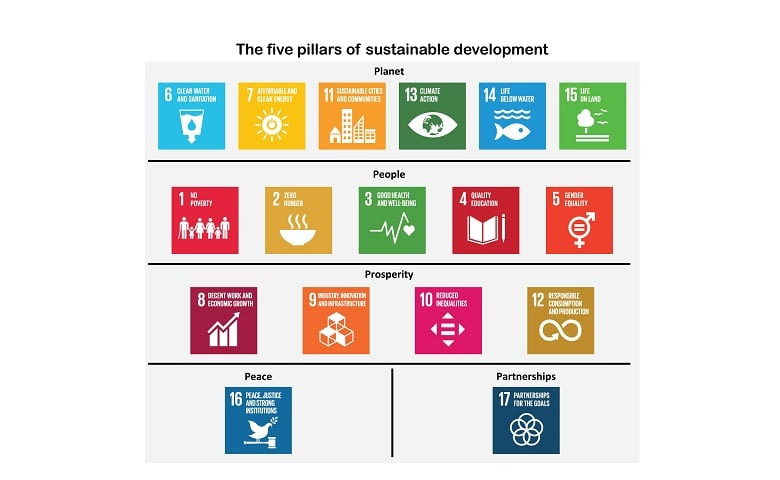Download Sustainable Development Goals (SDGs) and the new business paradigm for growth (PDF)
In September 2013, all 193 Member States of the United Nations joined forces to bring to light a world plan for action for sustainable development. “Transforming our world: the 2030 Agenda for Sustainable Development” (“Agenda 2030”), came into effect on 1 January 2016 and now defines and guides global development. At the heart of “Agenda 2030” are 17 Sustainable Development Goals (SDGs) and 169 corresponding targets which are applied to all nations and address economic, social, environmental and governance challenges, fight inequality, injustice, end extreme poverty, hunger and protect environment. The SDGs follow and build on the Millennium Development Goals established in 2000 and replace them with more inclusive goals to be achieved in the next 15 years, until 2030.
Serious and massive action is necessary in order to accomplish the goals envisioned in the Agenda until 2030. Achieving the SDGs requires the commitment of all stakeholders to accept the value they can bring to humankind and incorporate the SDGs into their own practices and operations. The success of this colossal initiative, demands unprecedented cooperation among governmental organizations, private sector, the third sector and communities at large. It is expected that that governments will turn to business to support them to achieve the SDGs through set national sustainable development priorities and plans as set out in formal commitment documents, legislation, local agendas (ie the Intended Nationally Determined Contributions (INDCs)) which eventually will require the mobilisation of all stakeholders. Together with political leaders and policy-makers, the SDG agenda can become a power for positive and long-lasting change. Achieving the SDGs could create 380 million jobs and help unlock at least $12 trillion in opportunities for business by 2030, which is stated in a flagship report from The Business & Sustainable Development Commission.
Extended research that has been available regarding the adoption of the SDGs and the level of integration to business. The results of the most recent Sustainable Development Goals Report 2017, demonstrate that progress toward each goal has been uneven and differs across regions. Without doubt, adopting the SDGs at business level is linked to massive positive social and environmental impact, however, it requires a good understanding of the mechanics of the SDGs as well as taking coordinated action.
Because of complexity, and lack of know-how, tools and resources, many companies are unable to make remarkable progress on their sustainability journey utilizing the SDSs. In fact, in a recent global survey, 92% of companies surveyed support the SDG agenda, but only 17% believe they have the right road map and programs to achieve the SDGs by 2030. No doubt, the great challenge for leadership is to mobilize business, increase success rate, support collaborations and start creating measurable impact.
Although there are 17 specific goals, it is crucial for business to understand that companies are not expected integrate all of them in their business operations, but, select the ones that are relevant to their business sector, size, maturity and strategic priorities. All SDGs provide a great source of inspiration in defining business strategies, innovation and investment decisions, but companies should pick the ones where they can have the most impact on. Companies in the Energy and Mining sector reckon they are most influential on SDG 7 (Affordable and clean energy) while companies in Healthcare industry focus on SDG3 (Good health and well-being). Moreover, the location of the company tells a lot about its SDG prioritization. Belonging to North America, the companies deem the most pressing goal is SDG 3 (Good Health and Well-being) whereas the European and Asian companies are focused on Climate Action above all, the SDG Commitment Report 100, reveals.
We are aware that for companies to accelerate brand differentiation and growth, they need to be more proactive in adopting the goals. SDGs is a promise for a better world and companies can lead in this global new paradigm currently being formulated.
Sustainability Knowledge Group is a global advisory firm dedicated to creating value, through strategic CSR and sustainability solutions. Sustainability Knowledge Group provides tailor-made training, coaching and advisory solutions grounded in international theory and successful application, and focuses on proven methodologies that bring tangible results, measurable impact and create better businesses.
If you would like to know more about how to lead in sustainability, utilise proven tools and gain new skills, contact the Sustainability Knowledge Group at: [email protected].
Download Sustainable Development Goals (SDGs) and the new business paradigm for growth (PDF)

